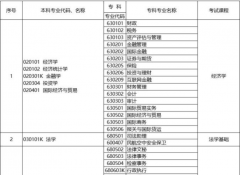


河南专升本英语意思相近用法却不同的近
专升本英语中总有那么些词,词汇和短语意义相近用法却不相同,一不小心就会选错或用错。对于即将参加2021年河南专升本考试的考生来说,下面库课李老师就给考生整理了这些词汇,希望对考生有帮助。
1.happen/take place二者都有“发生”的意思
(1)happen指事情的发生,往往带有"偶然"的意思。
●It happens that I am free today.
●恰好今天我没有事。
(2)take place 指事先安排或策划好而后发生,没有"偶然"的意思。
2. must/have to
(1)must表示说话人的主观看法;而have to则表示客观需要。
(2)mustn't意为“不可以;不允许”;don't have to意为“不必”。
如:●My father had to work when he was ten years old。
●The play is not interesting,I really must go now。
3. arrive/reach/get to 三者都有“到达”之意
(1)reach为及物动词。
●They reached Tianjin yesterday.昨天他们到达天津。
(2)arrive为不及物动词,后面接介词 in 或 at
(3)get to常用于口语,可代替前二者。
4.because/because of 二者均表示“因为”
(1)because是连词,引导状语从句。
●We stayed at home because it rained.因为下雨,我们呆在家。
(2)because of是短语介词,后面接名词性词语。
●We stayed at home because of the rain .因为下雨,我们呆在家。
5. in front of/in the front of
(1)in front of 意思是"在……前面",指甲物在乙物之前,两者互不包括;其反义词是behind (在……的后面)。
●He walked in fount of me。他走在我的前面。
●There are some flowers in fount of the house。房子前面有些花卉。
(2)in the front of 意思是"在某一空间内的前部",即甲物在乙物的范围之内;其反义词是at the back of…(在……范围内的后部)。
●There is a big desk and a blackboard in the fount of our classroom。我们的教室前边有一张大桌子和一块黑板。
●Our teacher stands in the fount of the classroom。我们的老师站在教室前。
6.sometime/sometimes/sometime/some times
(1)sometime是副词,可与过去时或将来时连用,表示"(在过去)某个时候"或"(在将来)某个时候"。
●I saw him sometime in May。
(2)some time多数情况下作名词短语,意为"一些时间;一些时候";它还可以作副词词组,用来表示一个未肯定的时刻,此时它可与sometime互换。
●I'll be away for some time。
(3)sometimes是一个表示时间频率的副词,意为"有时候"。
●Sometimes I help my mother with the housework。some times是"几次、几倍"之意。
●They have been there several times。
7. how long/how often/how far/how soon
(1)how long意为"多久、多长时间",主要是对一段时间进行提问,答语通常是(for)three days/weeks/months等时间段,它可用于各种时态。
●How long do you stay in Beijing every year?每年你在北京住多久?
(2)how often意为"多久……次、是否经常",用来提问在某一特定的时间进行某个动作的次数,答语通常是always,usually,often,sometimes,once/twice a day/month等。
●How often do you get to school very early?你多久早到校一次?
(3)how far意为"多远",对距离提问时用。
●How far is that? 那有多远?
(4)how soon意为"还要多久",是对从某个基本时间到将来某动作结束或某动作发生这段时间提问,常用在一般将来时态的句子中,其答语通常是"in + 一段时间"。
●How soon can you finish the work?还要多久你能完成这项工作?
●In half an hour.半小时后。
8. agree with/agree to/agree on
两者都有“同意“、”赞成”的意思
(1)agree with 后面常接表示人或意见(看法)的名词作宾语;还有“适合”、“符合”的含义。
●The climate here doesn't agree with him。他不适合这里的气候。
(2)agree to 后面一般接表示提议、办法、计划之类的名词作宾语。
(3)agree on 就…达成一致的意见。
9.across/cross/crossing/through/past
(1)cross 意为“横过, 穿过”为动词,相当于walk(go,run)across
●Look both ways before you cross the road。
(2)across意为“横过,穿过”为介词,不作动词,不能作谓语,常放在动词之后,如:go across
●He walked across the field。
(3)through 是介词,含有“从…中间穿越”之意,表示四周含有物体的穿越。
●The ball went through the window。
(4)past既可作形容词也可作副词,做副词时有:“穿过,越过”之意。●Will you be going past my house on your way home?
(5)crossing意为“渡口,人行横道,(铁路与公路的)交叉点。
●All the cars should stop before the zebra crossing。
10.few/a few/little/a little
虽然都表示“少”,但 :
(1) few,a few是可数的;
(2) little,a little是不可数的。
(3) a few,a little含肯定意味;
(4) few,little含否定意味。
●They have a little ink,don't they?他们有一点墨水,是吗?
●They have little ink,do they?他们几乎没有墨水,是吗?
●She has a few Chinese friends,doesn't she?他有几位中国朋友,是吗?
●She has few Chinese friends,does she?他几乎没有几位中国朋友,是吗?
●She has a little dog 她有一只小狗。
11.not…until, until
(1)not…until 直到…才… (主句动词是短暂性动词)
●He didn't go to bed until his mother came back...
(2)until 一直到… (主句中使用延续性动词)
●I study hard until it is midnight every day.
12. spend/pay/cost/take
(1)Sb. Spend…on sth. 某人花了…(时间、金钱)在某事上。
●I spend ten yuan on the book.
(2)spend (in) doing sth. 某人花了…(时间、金钱)做某事。
●She spent two hours in drawing the house.
(3)Sb. pay…for…sth. 某人为某物花了…钱。
●I paid 50 yuan for the clothes.
(4)Sth. cost sb. …某物花了某人…钱。
●It cost us five dollars.
(5)It takes/took sb. … to do sth. 花了某人…(时间、金钱)做某事。
●It takes us ten minutes to brush my teeth every day.
13.also/either/too/as well
(1)also用于肯定句。
●You study English and I also study it.你学英语,我也学。
(2)either用于否定句,并放在句尾。
●You don't study English and I don't study it either.你不学英语,我也不学。
(3)too和as well 用于肯定句,放在句尾,多用于口语。
●You are a student and I am a student,too.你是学生,我也是。
●You know the way and I know it as well.你知道路,我也知道。
14.besides/except/except for/but“除……之外”
(1)besides的意思是"除…之外,还有…"是肯定的;
(2)besides后面的宾语在内,含有"加上"的意思。
●I have three other pens besides this.除了这支笔外,我还有另外三支笔。
2021年河南专升本考试时间为6月9日,对于准备参加考试的考生来说,一定要在考前好好备考,考生一定要在考前放松心态,争取在考试中能脱颖而出。
-
报考二建需要社保吗
现代华西教育
-
学历提升教育机构排的状
现代华西教育
-
在职人员有必要学历提升
现代华西教育
-
提历报考什么专业比较好
现代华西教育






